Victoria Churchill, East Carolina University, USA. Vanessa Mallory, Katherine C. Henderson, Claire A. Spears, Nurul Kodriati, Terry F. Pechacek, Scott R. Weaver, Lucy Popova, Georgia State University, USA.
Heated tobacco products have been gaining attention around the world, often marketed as sleek alternatives to cigarettes. In March 2025, Philip Morris International (PMI) relaunched IQOS in the United States, starting in Austin, Texas. Unlike regular cigarettes that burn tobacco, IQOS is a device that heats tobacco sticks (called HEETS) instead of burning them. Having previously reported on the launch of IQOS in Atlanta, Georgia, in May 2025 our team visited this new pop-up store in Austin to learn about the IQOS experience and the potential implications for public health. The shop was a trailer on West 3rd Street, next to barbecue stands and a smoke shop (Figure 1). A security guard stood outside, and identity documents were scanned at the door. Inside, couches and display shelves filled the small space (Figure 2). Colorful IQOS devices and accessories decorated the shelves and video screens showed upbeat ads with young adults and slogans like “less smell than cigarettes” and “the HEET of the moment” (Figure 3-6). Signs reminded buyers that the product is not for people under 21 and not meant to help people quit smoking. One sign had a list of eight items named as “Good conversion practices for PMI’s smoke-free products” (Figure 7). This included that IQOS products are not made for people who have never used or have quit using tobacco or nicotine products and that they are “not designed as cessation aids.” This sign had not been seen in our previous work in GeorgiaSales assistants asked visitors to confirm they currently use nicotine. Then, they offered an IQOS trial inside the store. For $2, customers got two packs of HEETS, each with 10 sticks. Signing up required submitting full personal details on the IQOS website. Out-of-town visitors were given a local ZIP code to use.
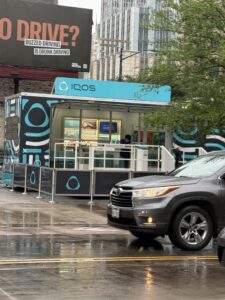

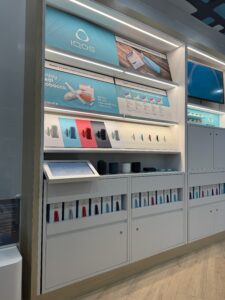
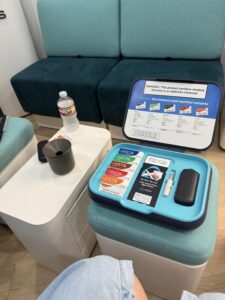
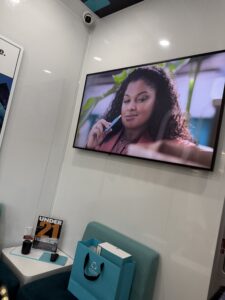
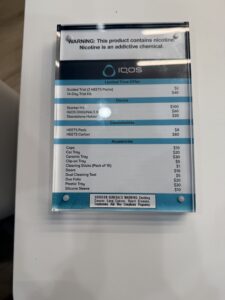
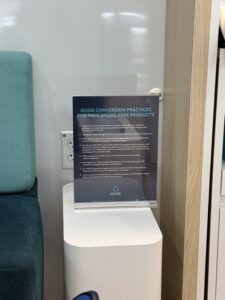
The assistant stressed that IQOS is only for current tobacco users. At the display table, five HEETS flavors were showcased, ranging from strong menthol (“Blue”) to more traditional blends (“Amber”). Customers could buy two extra packs for $2 more. The assistant then gave a hands-on demonstration for the customers. The assistant used their customized personal device while explaining how to insert the HEETS and use the trial devices. The assistant described IQOS as more discreet than cigarettes, with no smoke or fire. They also suggested it was free of “additives,” though the company’s website does list added ingredients like propylene glycol and flavorings. When asked about cannabis use, which is still illegal for non-medical use in many U.S. states including Texas, the assistant denied any such option. They also noted that some customers drive from other states, sometimes 14 hours, just to shop. Out-of-state buyers could buy multiple cartons, while locals faced limits to reduce resale risk.The Austin store sold the IQOS 3.0 device for $60 or a $100 starter kit with 10 packs of HEETS. Single packs cost $8, or $80 for a carton. Accessories ranged from colorful caps and sleeves to containers for used HEETS and cleaning tools. The store also offered a “Refer-a-Friend” program. Customers who referred others could earn a $30 voucher when their friend bought a device or completed a trial.
Follow-up after the visit was quick. Within three days, one team member received six phone calls and three text messages from IQOS support (Figure 8). If the device was bought under the $40 trial offer, customers have a two-week trial period to decide whether to keep it. If not returned by the end of that period, the remaining $60 is charged to complete the full purchase price. The device comes with a one-year warranty and customer support is available through online chat, phone, and text. Store staff also had tools on-site to fix performance issues.It is important to monitor how IQOS is marketed and used. Youth, people with low income, racial and ethnic minorities, and LGBTQ+ communities face higher risks from tobacco. Preventing use among people who do not smoke, especially youth, is key. The Austin store staff checked identity documents and highlighted age limits. Still, in store advertising used young models, price deals, and sleek branding. These strategies have long been tied to youth tobacco use. For people who smoke, IQOS may add to use rather than replace it. Because IQOS can be used in smoke-free areas, it may encourage dual use—cigarettes in some places and IQOS in others, potentially increasing total tobacco exposure. Cost is another factor. At $60 for the device and $8 per pack, although marketed by PMI as an alternative to smoked tobacco, IQOS may not be affordable for people who smoke and are on low-income, who already carry heavier tobacco-related health burdens.One notable absence from our visit: we observed no in-store claims about reduced harm. In 2022, the FDA allowed PMI to market IQOS 3.0 with certain “modified exposure” claims. Since then, PMI has highlighted FDA authorization in ads and lobbying. Online, promotions often point to this status as proof of reduced risk.
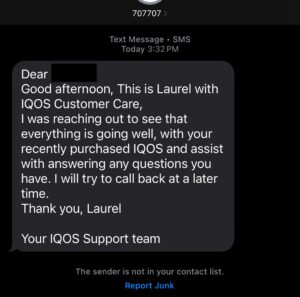
The Austin launch felt very similar to earlier stores in Atlanta. The messages focused on convenience, smell reduction, and sleek design, but we noted there were no direct health claims. New strategies included a two-week trial program that let customers test the device before committing, more customization features, and fast follow-up from customer support. PMI also seems more aggressive in their expansion with plans to open locations in Fort Lauderdale, Florida and Jackson, Mississippi. As IQOS grows in the U.S., public health researchers and communities will need to pay attention. Marketing that looks trendy and harmless can still create risks, especially if it attracts new users or promotes dual use.
Victoria Churchill, East Carolina University, USA. Vanessa Mallory, Katherine C. Henderson, Claire A. Spears, Nurul Kodriati, Terry F. Pechacek, Scott R. Weaver, Lucy Popova, Georgia State University, USA.